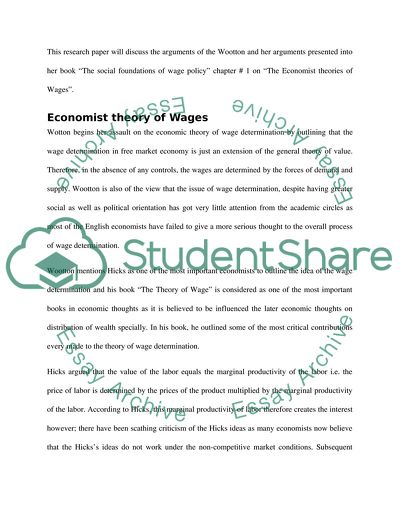Cite this document
(The Basic Criticism of Wootton on the Existing Theories of Wage Literature review, n.d.)
The Basic Criticism of Wootton on the Existing Theories of Wage Literature review. Retrieved from https://studentshare.org/finance-accounting/1721117-wootton1955-argued-for-a-social-approach-in-relation-to-pay-and-reward-setting-why-did-she-think-that-orthodox-economic-theories-were-insufficient-and-how-do-social-factors-influence-reward-structures-in-global-labour-markets
The Basic Criticism of Wootton on the Existing Theories of Wage Literature review. Retrieved from https://studentshare.org/finance-accounting/1721117-wootton1955-argued-for-a-social-approach-in-relation-to-pay-and-reward-setting-why-did-she-think-that-orthodox-economic-theories-were-insufficient-and-how-do-social-factors-influence-reward-structures-in-global-labour-markets
(The Basic Criticism of Wootton on the Existing Theories of Wage Literature Review)
The Basic Criticism of Wootton on the Existing Theories of Wage Literature Review. https://studentshare.org/finance-accounting/1721117-wootton1955-argued-for-a-social-approach-in-relation-to-pay-and-reward-setting-why-did-she-think-that-orthodox-economic-theories-were-insufficient-and-how-do-social-factors-influence-reward-structures-in-global-labour-markets.
The Basic Criticism of Wootton on the Existing Theories of Wage Literature Review. https://studentshare.org/finance-accounting/1721117-wootton1955-argued-for-a-social-approach-in-relation-to-pay-and-reward-setting-why-did-she-think-that-orthodox-economic-theories-were-insufficient-and-how-do-social-factors-influence-reward-structures-in-global-labour-markets.
“The Basic Criticism of Wootton on the Existing Theories of Wage Literature Review”, n.d. https://studentshare.org/finance-accounting/1721117-wootton1955-argued-for-a-social-approach-in-relation-to-pay-and-reward-setting-why-did-she-think-that-orthodox-economic-theories-were-insufficient-and-how-do-social-factors-influence-reward-structures-in-global-labour-markets.


